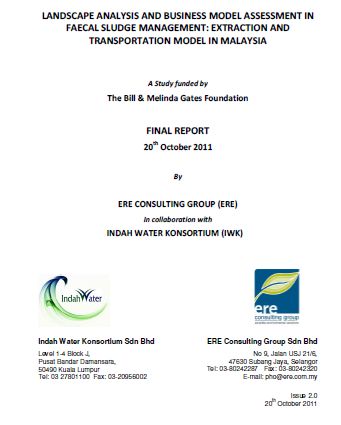Landscape analysis and business model assessment in faecal sludge management: extraction and transportation model in Malaysia - Final report
Ho, P. Y. C. et al. (2011)

Published in: 2011
Publisher:
Consultancy report by ERE Consulting Group in collaboration with INDAH Water Konsortium (IWK) commissioned by Bill & Melinda Gates Foundation, Seattle, USA
Author:
Ho, P. Y. C. et al.
Uploaded by:
SuSanA secretariat
Partner profile:
common upload
6006 Views
264 Downloads
Location of library entry
Content - Summary
The study was undertaken in three (3) model cities in Peninsular Malaysia and included Kuala Lumpur (land area 243km2), which is the capital city; Melaka (land area 689km2), the capital city of the State of Melaka; and Kuala Terengganu (land area 605km2), the capital city of the State of Terengganu.
CONCLUSIONS AND RECOMMENDATIONS
Results of the five-year financial projection for each of the operators to evaluate and determine a possible scale of operation that is both manageable and realistic for the private sector to invest into the FSM business, show that under present Malaysian conditions, the large-scale operator has the distinct advantage over the medium-size operator, being able to operate profitably, whereas the latter would not. The financial sensitivity analysis undertaken showed that financial viability was significantly affected by a 5% drop in revenue or a similar increase in operating cost. An increase of 50% in fuel cost would also affect profitability but not as seriously as the former two situations.
Nevertheless, the large-scale operations also entail higher resource commitments, both in terms of investments, and human resources, all of which are not always and easily available in developing countries. The high cost of an FSM service truck is a major capital investment for all operators but affects more the medium-size sludge emptying operator. A reduction in cost (which is due to the high duty and taxes imposed by the government) would have positive impact on the viability of desludging business.
A model that incorporates the Geo-Tube extension is recommended to reduce a major technical constraint caused by large travel distances. The model when applied to the medium-size operator in Melaka demonstrated that the Geo-tube extension into the “standard” FSM service model is a key determinant in improving the financial viability of the medium-size business.
The above business model is premised on a key assumption that FSM services are to be scheduled as past performances of existing service providers, pre- and post-WSIA, clearly showed that a responsive approach to desludging services is not desirable. In addition, the level of tariff that is set has to be realistic and based on sound assumptions of costs that determine its value, as the FSM business is sensitive to even a small change in the tariff.
Corresponding author:
Ho Yueh Chuen (Peter)
ERE Consulting Group Sdn Bhd
9-2 & 9-3, Jalan USJ 21/6
47630 Subang Jaya,
Selangor, MALAYSIA
Email : pho@ere.com.my
URL : www.ere.com.my
Bibliographic information
Ho, P. Y. C. et al. (2011). Landscape analysis and business model assessment in faecal sludge management: extraction and transportation model in Malaysia - Final report. Consultancy report by ERE Consulting Group in collaboration with INDAH Water Konsortium (IWK) commissioned by Bill & Melinda Gates Foundation, Seattle, USA
Filter tags
East Asia & Pacific English Faecal sludge treatment processes Fundamental research and engineering Peri-urban















